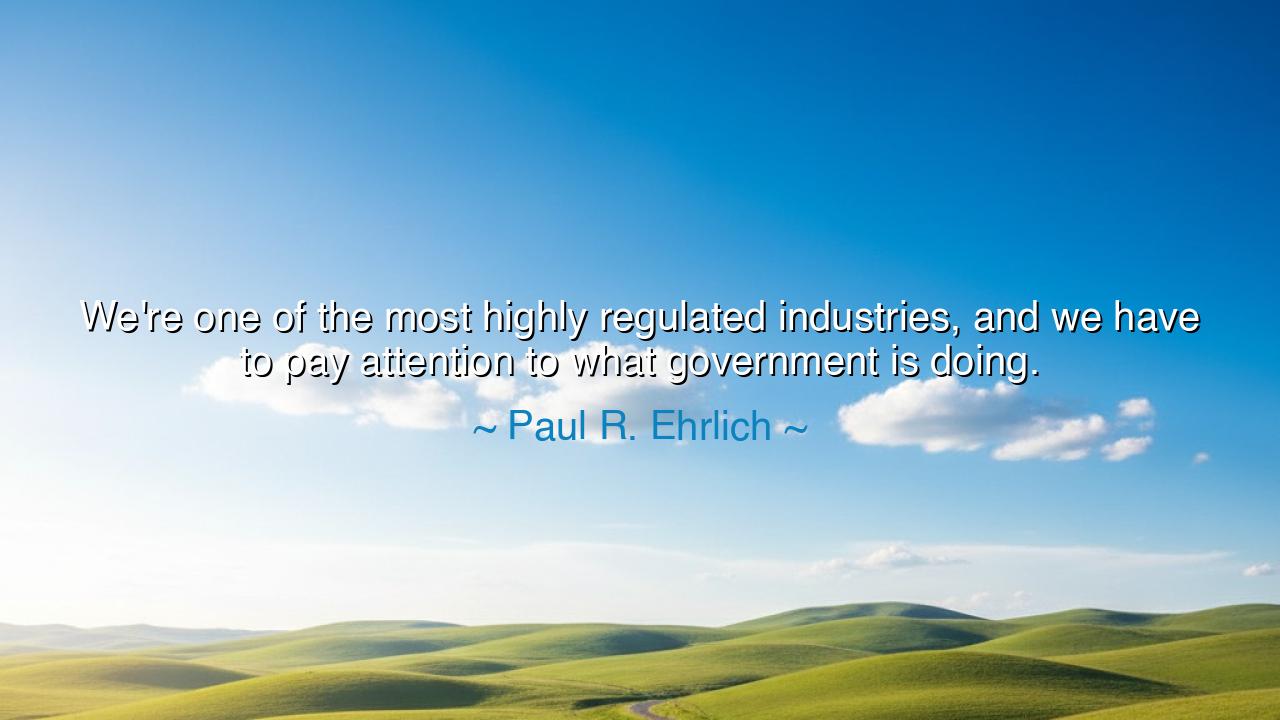
We're one of the most highly regulated industries, and we have to
We're one of the most highly regulated industries, and we have to pay attention to what government is doing.






Hear, O seekers of understanding and balance, the words of Paul R. Ehrlich, spoken not in complaint, but in revelation: “We're one of the most highly regulated industries, and we have to pay attention to what government is doing.” In this simple sentence lies a vast ocean of meaning—a truth about responsibility, vigilance, and the delicate harmony between innovation and authority. Ehrlich reminds us that those who shape the future through science and industry must not walk blindly; they must keep watch over the structures of power that guide, restrict, and at times, protect their work.
Ehrlich, a biologist and thinker whose warnings about population and environment stirred the conscience of nations, knew deeply the tension between scientific pursuit and political oversight. His words emerge from a life lived at the crossroads of discovery and policy, where every breakthrough is shadowed by regulation, and every idea must pass through the gatekeepers of governance. To work within such an environment is to recognize that progress demands both creativity and compliance, vision and awareness, invention and accountability.
Throughout history, the balance between innovation and authority has been both vital and volatile. Consider the story of Galileo Galilei, whose telescope revealed the vast order of the cosmos, yet whose truth was shackled by the Church’s regulatory might. His discoveries, though pure in science, collided with the boundaries imposed by institutional control. Ehrlich’s warning reflects this enduring dynamic: the individual must watch the government as much as the government watches the individual, for only in mutual awareness can progress proceed without tyranny or recklessness.
In the modern age, this lesson resounds even more deeply. The industries that shape civilization—energy, medicine, communication—are woven tightly with the threads of regulation. Those who labor within them cannot afford indifference. When governments legislate without insight, innovation is stifled; when industries act without restraint, chaos ensues. Thus Ehrlich’s words form a bridge of wisdom: to pay attention is to preserve not only one’s livelihood, but the equilibrium of society itself.
We may look to the example of Japan’s post-war reconstruction, where close cooperation between government and industry rebuilt a shattered nation into a technological titan. Leaders and innovators worked in tandem, watching one another not as adversaries, but as partners in accountability. The result was progress born from discipline, freedom guided by structure—proof that when vigilance and integrity unite, regulation becomes a catalyst rather than a cage.
Yet Ehrlich’s counsel also carries a moral undertone. To “pay attention” is more than a bureaucratic necessity—it is a civic duty, a call to awareness in an age when the machinery of state can move swiftly and silently. Whether in science, commerce, or art, every citizen must recognize the power of governance to shape destiny. Inattention breeds ignorance, and ignorance invites domination. But the attentive mind, like a sentinel on the walls of liberty, ensures that law serves humanity, not the reverse.
The lesson, then, is clear: in every realm of work or creation, one must engage not only with one’s craft but with the forces that govern it. Learn the laws that shape your field. Question policies that hinder truth or harm progress. Support transparency, dialogue, and integrity between institutions and innovators. To act thus is to honor both freedom and responsibility, to build a society where regulation and progress walk hand in hand, each guarding the other from excess.
So let Ehrlich’s words echo as a guide to all who labor within systems great or small: pay attention—to power, to policy, to purpose. For only those who are awake to the movements of governance can ensure that their work serves not merely profit or prestige, but the enduring good of mankind.






AAdministratorAdministrator
Welcome, honored guests. Please leave a comment, we will respond soon